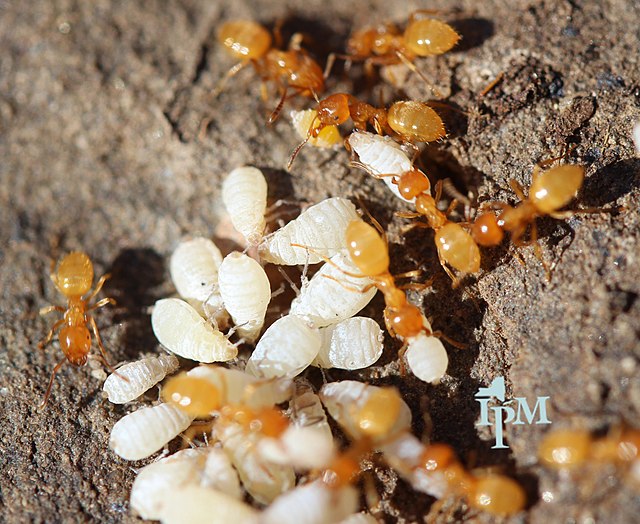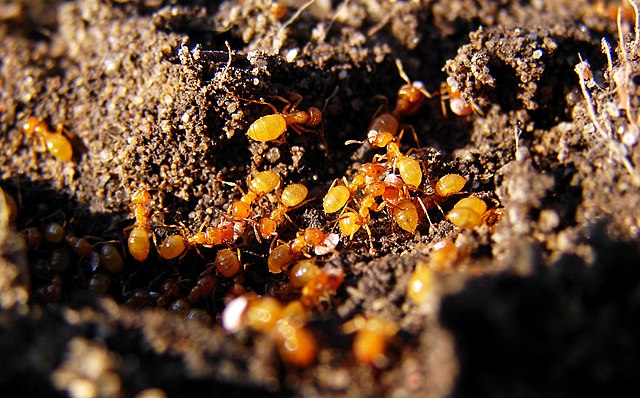Citronella ants are one of the more unusual pests that New Jersey homeowners and business owners may encounter. When threatened or stepped on, these small yellow ants exude a lemon-like aroma, hence the name citronella ant.
Citronella ants (Acanthomyops interjectus) build their nests in damp soil near foundations or under them. These ants eat aphid honeydew and don’t care for human food. Citronella ants can be found digging in the soil or when vast numbers of these ants’ winged reproductive stages (called swarmers) appear along cement walls or floors. Early spring (March and April) and late September to October are the best times to witness winged forms. They range in hue from reddish brown to dark brown. Citronella ants’ worker forms are yellow to brownish-yellow in hue.
Citronella ants, unlike carpenter ants, which are damaging to homes and other structures, do not pose a threat to property.
These pests don’t make nests or reproduce inside of your house. They do, however, occasionally enter via open doors and windows, swarming inside from the earth that houses their colony. Citronella ants swarming in the basement are common, and the swarm probably comes from a colony residing in the ground beneath the basement slab floor. Citronella ant swarmers, like termites, develop wings and go through a swarming stage, which might bring them indoors. Ant colonies can also be seen in yards or around foundations throughout New Jersey.
From New England to the Pacific Northwest, and south to Florida and Mexico, this ant is common.

What are the dangers of citronella ants?
Swarms of citronella ants that last three or four days are a nuisance for New Jersey residents. The pests, thankfully, do not sting or inflict harm. These ants are commonly mistaken for termites due to their similar appearance and activity.
Citronella ants have no stinger and do not bite, hence they do not pose a health risk to humans. They are referred to as nuisance ants, and they can cause a stench for property owners.
Get Rid of Citronella Ants in your NJ Home & Check for Moisture Problems.
Call 609-549-3058 or Contact Us Now
How do you know if you have a citronella ant infestation?
Citronella ant activity is most often detected by foraging workers and swarms of winged reproductive ants. Earthen mounds, which are formed when ants nest in soil, are another symptom. Citronella ants get their name from the lemon or citronella-like scent that they emit when crushed. Citronella ants are also nocturnal, which means they are rarely noticed by homeowners.
Citronella ants can become an annoying problem both inside and outside the home when they swarm in the spring. While they will not multiply or do damage inside a property, they can enter through holes in doorways or windows, worrying homeowners who mistake them for termites.
What Do Citronella Ants Look Like?
Citronella ants range in color from yellow to yellowish-brown. Queens are slightly larger than adult workers, measuring between 1/8th and 3/16th of an inch in length. When viewed from the side, they feature a segmented body that is unevenly spherical.
Nesting Habits of Citronella Ants
Citronella ants build their nests outside in moist soil near the home foundation, beneath concrete slabs, and under decaying trees or logs. They will build their nests inside homes in high-moisture regions such as behind bathroom tiled walls, beneath bathroom or kitchen flooring, and in moist crawl spaces. They also build nests near foundations and in crawlspaces. They build mounds of earth while digging underground galleries.

Citronella ants build their nests in high-moisture places within homes. They frequently build their nests beneath slabs and porches. While nesting beneath a slab, they may push soil up through a fissure in the slab. This soil is sometimes misinterpreted by homeowners as a sign of termite activity. They frequently build their nests in wood that has been weakened by fungus or termites. If citronella ants infest a home, it could indicate that there is a moisture problem. Make sure to contact a professional to help you locate and resolving the moisture issue.
What do Citronella Ants Eat?
They live off the honeydew that aphids emit and build their nests in gardens, lawns, and near home foundations. Citronella ants eat honeydew excreted by insects that reside underground and feed on plant roots nearly entirely. They will rarely, if ever, eat food found in people’s houses.
The Reproduction Cycle
A queen creates new workers and swarmers (winged males and females) inside the nest on a regular basis. These winged creatures leave the nest to mate. The mated females go on to be founding queens for new colonies, whereas the males die soon after.
Swarmers
Swarmers are the winged ants that are most commonly found in New Jersey homes. They’re known as swarmers because they abandon their colonies to find new ones and reproduce. The smaller worker citronella ants stay in the colony and are rarely seen by homeowners.
When the winged ants leave the colonies for their mating flight, citronella ants can become a nuisance. Winged ants that emerge through a gap in a slab or a basement wall can be quite aggravating to homeowners. Nothing will be harmed by these winged ants. The most efficient technique to remove them rapidly is with a vacuum cleaner.
Controlling Citronella Ants
Citronella ants can be discouraged by removing potential nesting locations. Chemical measures are rarely necessary or advised because Citronella ants are only a nuisance when they swarm. Normal ant baits will not work on citronella ants. Landscape sprays can be used to saturate outside nests, but swarming only lasts three to four days.
Here are some ways to keep Citronella Ants at bay:
- Stacks of firewood should be placed as far away from the house as feasible.
- Woodpiles, compost piles, and outdoor trash should all be kept out of sight of your home.
- Check to see if your gutters are correctly directing water away from your house and foundation.
- Any leaking outdoor fixtures, indoor fixtures, pipes, or faucets should be repaired or replaced.
- Any water-damaged wood in your home should be removed and/or replaced.
- Seal all cracks going outside and use screens in your windows to prevent these ants from entering your home. Ants will seek the path of least resistance, which means they will concentrate where the foundation is weak. Citronella ants will eventually stop searching if you plug all of these weak areas.
The good news is that these ants prefer to be outside rather than inside your home, but that doesn’t mean they won’t venture inside on occasion. If you detect a swarm near your home on a regular basis, you should try to find the colony.
Colonies typically mound the dirt around their entrance opening in the same way that other ants do. The mounds can be destroyed by injecting an insecticide into the holes. Because many pesticides are not for use by the general public and qualified specialists will have the right tools, you should hire a professional pest control firm to complete this task.
Citronella ants aren’t as aggressive as other ants, so there’s no need to be concerned about them invading or destroying your home. However, if you’re concerned about a colony, call Patriot Property Restoration, LLC to learn how we can help you solve the problem safely and effectively.
